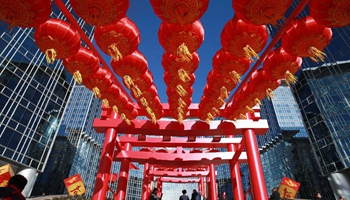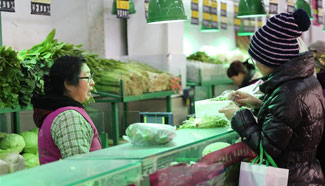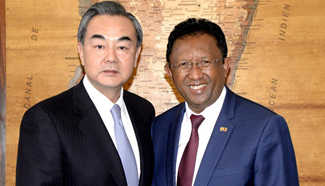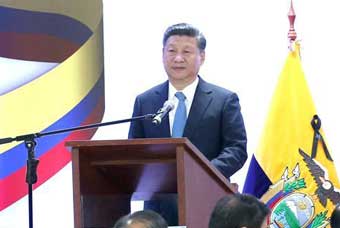By Xinhua Writer Wang Zhuolun
BEIJING, Jan. 10 (Xinhua) -- A pioneering spirit has always shaped and will further guide Switzerland-China ties, Swiss Ambassador to China Jean-Jacques de Dardel told Xinhua in an exclusive interview.
Chinese President Xi Jinping will pay a state visit to Switzerland from Jan. 15-18, attending activities including the 47th World Economic Forum annual meeting in Davos, the Foreign Ministry announced Tuesday.
The two countries established an innovative strategic partnership during then-Swiss President Johann Schneider-Ammann's state visit to China in April 2016, the first China has developed with a foreign country.
"This new partnership is not surprising and certainly rational," said de Dardel.
Innovation is a top priority among the five development concepts outlined in China's 13th Five-Year Plan period (2016-2020), the four others being coordination, green development, opening up and sharing.
"Obviously, with China bent on furthering innovation, while Switzerland is a champion of innovation, it makes sense to refer to innovation to enrich the content of bilateral relations," de Dardel said.
Stressing that Switzerland-China ties have been characterized by a number of "firsts," de Dardel said Switzerland was among the first Western countries to establish diplomatic relations with the People's Republic of China, and among the first group of European countries to recognize China's market economy status. The first industrial joint venture China entered into was with Switzerland.
"All these constitute the basis of our mutual trust," he said.
De Dardel highlighted the importance of aligning Switzerland's "Industry 4.0" with "Made in China 2025" to enhance the bilateral innovative strategic partnership.
De Dardel noted that the two strategies share the same goals of improving production, abandoning the obsolete, and jumping up the technological ladder for more sustainable development.
Hailing the dramatic progress China has achieved during the past 30-plus years, de Dardel said Switzerland embraces more innovation-driven cooperation with China, the world's second-largest economy, which is committed to deepening reform.
De Dardel expressed his appreciation that in the process of transformation, the Chinese economy is moving away from irrational production and toward high-quality products and services.
Switzerland, upon considering the improvement and transformation of the Chinese economy, decided it warranted market economy status, de Dardel said, adding that he hopes that through adjustments, China's market economy will become more mature.
"We believe inclusiveness is always better than exclusion," he stressed.
Despite sluggish world economic growth, de Dardel said he is "very impressed" by China's GDP, which still grows at well above 6 percent annually, adding that the country is increasingly seen as a model to the developing world.
"The contribution of the Chinese economy to globalization is more than enormous, because China is still strengthening its opening up," he added.
As a dedicated supporter of multilateralism, China is on its way to playing a greater role in global economic governance, de Dardel said, listing examples such as China's successful hosting of the G20 summit, proposing and implementing the Belt and Road Initiative, and helping operate the Asia Infrastructure Investment Bank.
De Dardel said the two countries are always ready to break new ground.
Xi Jinping will be the first Chinese president to attend the World Economic Forum annual meeting. De Dardel said Xi's presence will demonstrate China's proactive attitude toward international governance and make the world economy better.
"I see it as a positive sign living up to what China has become," de Dardel said.














